The Impact of COVID-19 on Global Sports Tourism and Hospitality
VerifiedAdded on 2022/12/14
|7
|1697
|380
Report
AI Summary
This report provides a comprehensive analysis of the impact of COVID-19 on the sports tourism and hospitality industries. It begins by exploring the broad effects of the pandemic on these sectors, examining both positive and negative consequences across social, economic, and environmental dimensions. The report then delves into the role of the World Health Organization (WHO) in decisions regarding the rescheduling of the 2020 Summer Olympics, and analyzes the positive and negative impacts of the event's postponement on various stakeholders, including sponsors, staff, athletes, and the host country. The report further assesses the advantages and disadvantages of postponing versus canceling the Tokyo Olympics, and explores the marketing strategies employed for the event. Finally, it evaluates the impact of COVID-19 on Japan as a tourist destination, considering economic losses and the decline in tourism revenue. The report concludes by summarizing the key findings and emphasizing the overall impact of the pandemic on the sports tourism landscape.
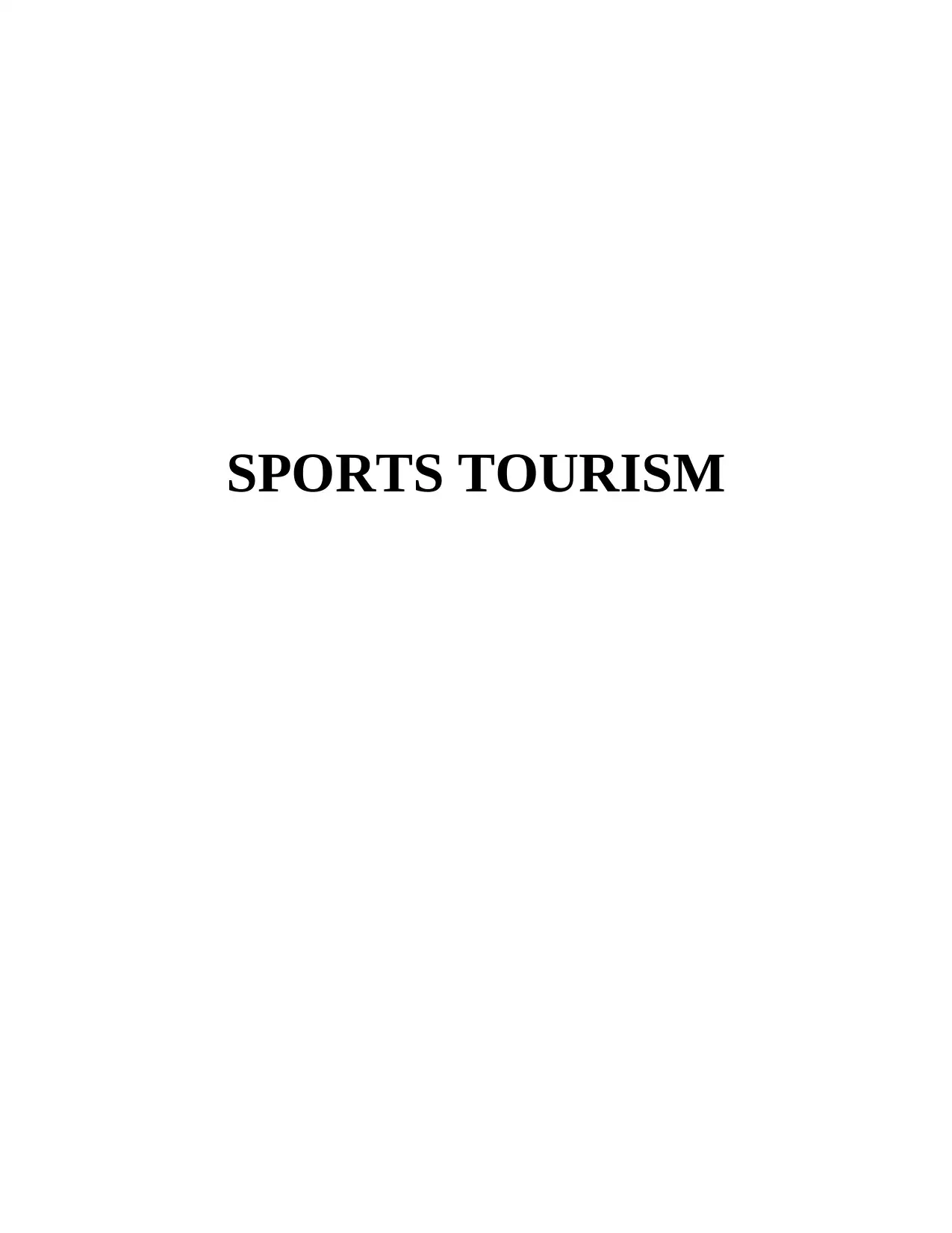
SPORTS TOURISM
Paraphrase This Document
Need a fresh take? Get an instant paraphrase of this document with our AI Paraphraser
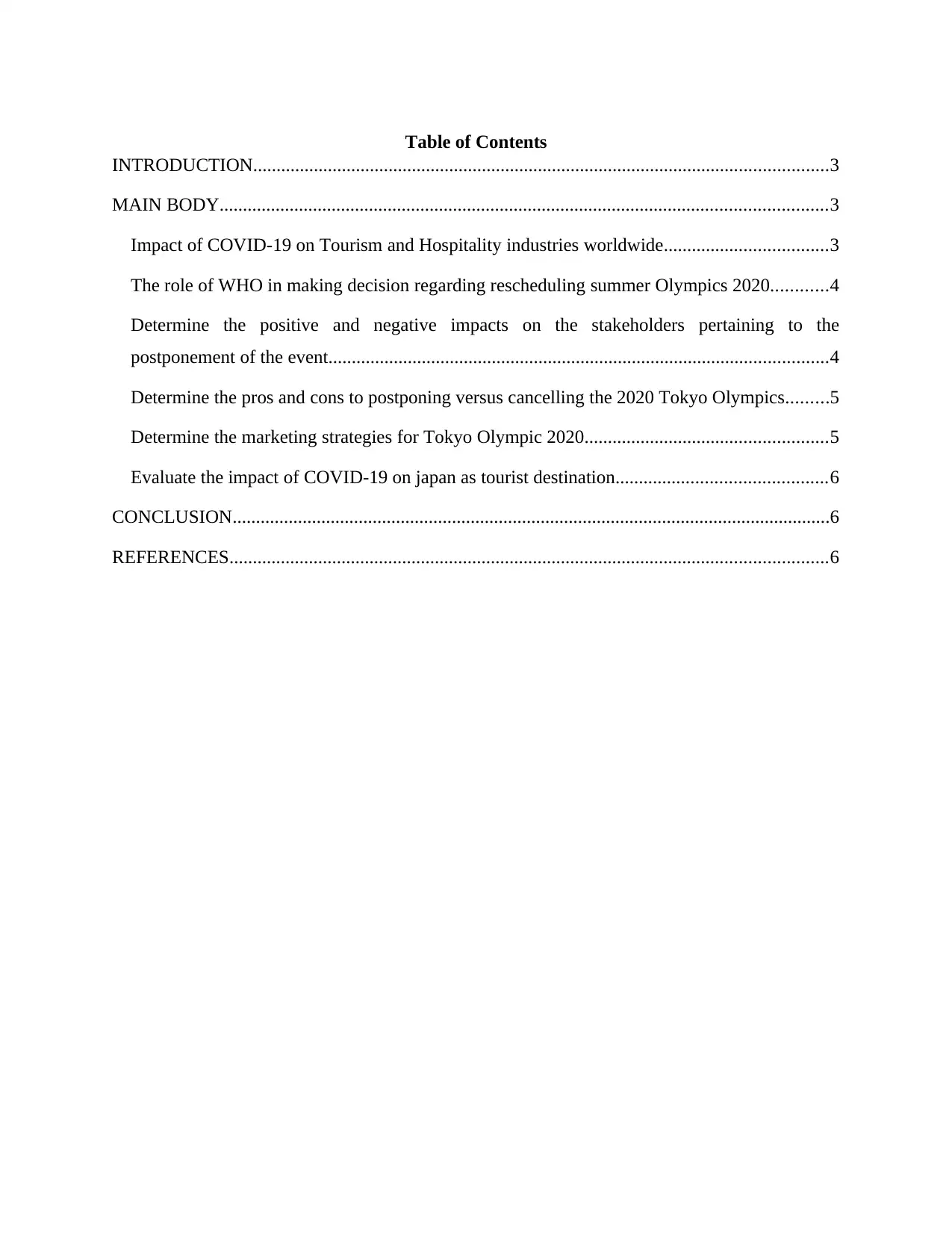
Table of Contents
INTRODUCTION...........................................................................................................................3
MAIN BODY..................................................................................................................................3
Impact of COVID-19 on Tourism and Hospitality industries worldwide...................................3
The role of WHO in making decision regarding rescheduling summer Olympics 2020............4
Determine the positive and negative impacts on the stakeholders pertaining to the
postponement of the event...........................................................................................................4
Determine the pros and cons to postponing versus cancelling the 2020 Tokyo Olympics.........5
Determine the marketing strategies for Tokyo Olympic 2020....................................................5
Evaluate the impact of COVID-19 on japan as tourist destination.............................................6
CONCLUSION................................................................................................................................6
REFERENCES................................................................................................................................6
INTRODUCTION...........................................................................................................................3
MAIN BODY..................................................................................................................................3
Impact of COVID-19 on Tourism and Hospitality industries worldwide...................................3
The role of WHO in making decision regarding rescheduling summer Olympics 2020............4
Determine the positive and negative impacts on the stakeholders pertaining to the
postponement of the event...........................................................................................................4
Determine the pros and cons to postponing versus cancelling the 2020 Tokyo Olympics.........5
Determine the marketing strategies for Tokyo Olympic 2020....................................................5
Evaluate the impact of COVID-19 on japan as tourist destination.............................................6
CONCLUSION................................................................................................................................6
REFERENCES................................................................................................................................6
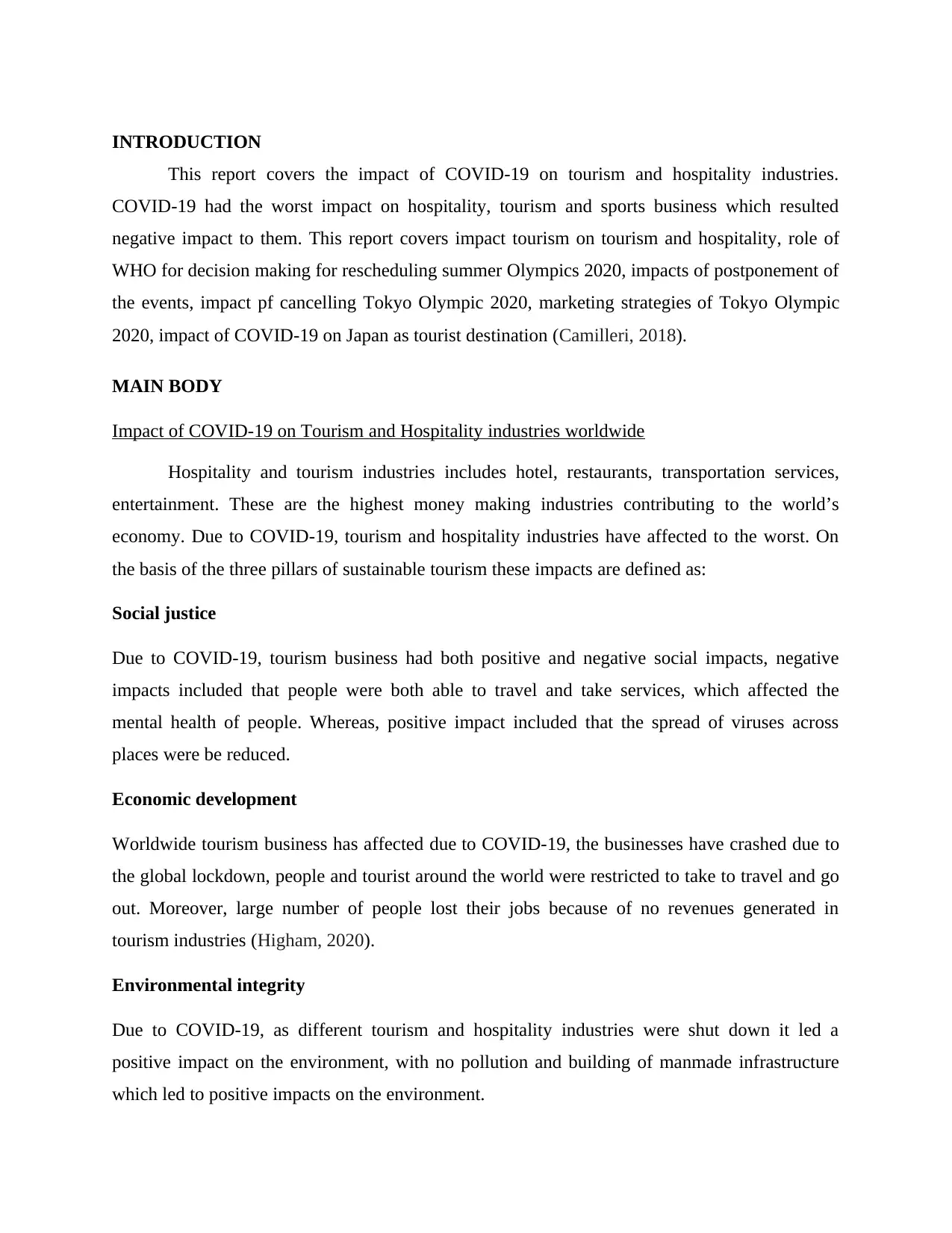
INTRODUCTION
This report covers the impact of COVID-19 on tourism and hospitality industries.
COVID-19 had the worst impact on hospitality, tourism and sports business which resulted
negative impact to them. This report covers impact tourism on tourism and hospitality, role of
WHO for decision making for rescheduling summer Olympics 2020, impacts of postponement of
the events, impact pf cancelling Tokyo Olympic 2020, marketing strategies of Tokyo Olympic
2020, impact of COVID-19 on Japan as tourist destination (Camilleri, 2018).
MAIN BODY
Impact of COVID-19 on Tourism and Hospitality industries worldwide
Hospitality and tourism industries includes hotel, restaurants, transportation services,
entertainment. These are the highest money making industries contributing to the world’s
economy. Due to COVID-19, tourism and hospitality industries have affected to the worst. On
the basis of the three pillars of sustainable tourism these impacts are defined as:
Social justice
Due to COVID-19, tourism business had both positive and negative social impacts, negative
impacts included that people were both able to travel and take services, which affected the
mental health of people. Whereas, positive impact included that the spread of viruses across
places were be reduced.
Economic development
Worldwide tourism business has affected due to COVID-19, the businesses have crashed due to
the global lockdown, people and tourist around the world were restricted to take to travel and go
out. Moreover, large number of people lost their jobs because of no revenues generated in
tourism industries (Higham, 2020).
Environmental integrity
Due to COVID-19, as different tourism and hospitality industries were shut down it led a
positive impact on the environment, with no pollution and building of manmade infrastructure
which led to positive impacts on the environment.
This report covers the impact of COVID-19 on tourism and hospitality industries.
COVID-19 had the worst impact on hospitality, tourism and sports business which resulted
negative impact to them. This report covers impact tourism on tourism and hospitality, role of
WHO for decision making for rescheduling summer Olympics 2020, impacts of postponement of
the events, impact pf cancelling Tokyo Olympic 2020, marketing strategies of Tokyo Olympic
2020, impact of COVID-19 on Japan as tourist destination (Camilleri, 2018).
MAIN BODY
Impact of COVID-19 on Tourism and Hospitality industries worldwide
Hospitality and tourism industries includes hotel, restaurants, transportation services,
entertainment. These are the highest money making industries contributing to the world’s
economy. Due to COVID-19, tourism and hospitality industries have affected to the worst. On
the basis of the three pillars of sustainable tourism these impacts are defined as:
Social justice
Due to COVID-19, tourism business had both positive and negative social impacts, negative
impacts included that people were both able to travel and take services, which affected the
mental health of people. Whereas, positive impact included that the spread of viruses across
places were be reduced.
Economic development
Worldwide tourism business has affected due to COVID-19, the businesses have crashed due to
the global lockdown, people and tourist around the world were restricted to take to travel and go
out. Moreover, large number of people lost their jobs because of no revenues generated in
tourism industries (Higham, 2020).
Environmental integrity
Due to COVID-19, as different tourism and hospitality industries were shut down it led a
positive impact on the environment, with no pollution and building of manmade infrastructure
which led to positive impacts on the environment.
⊘ This is a preview!⊘
Do you want full access?
Subscribe today to unlock all pages.

Trusted by 1+ million students worldwide
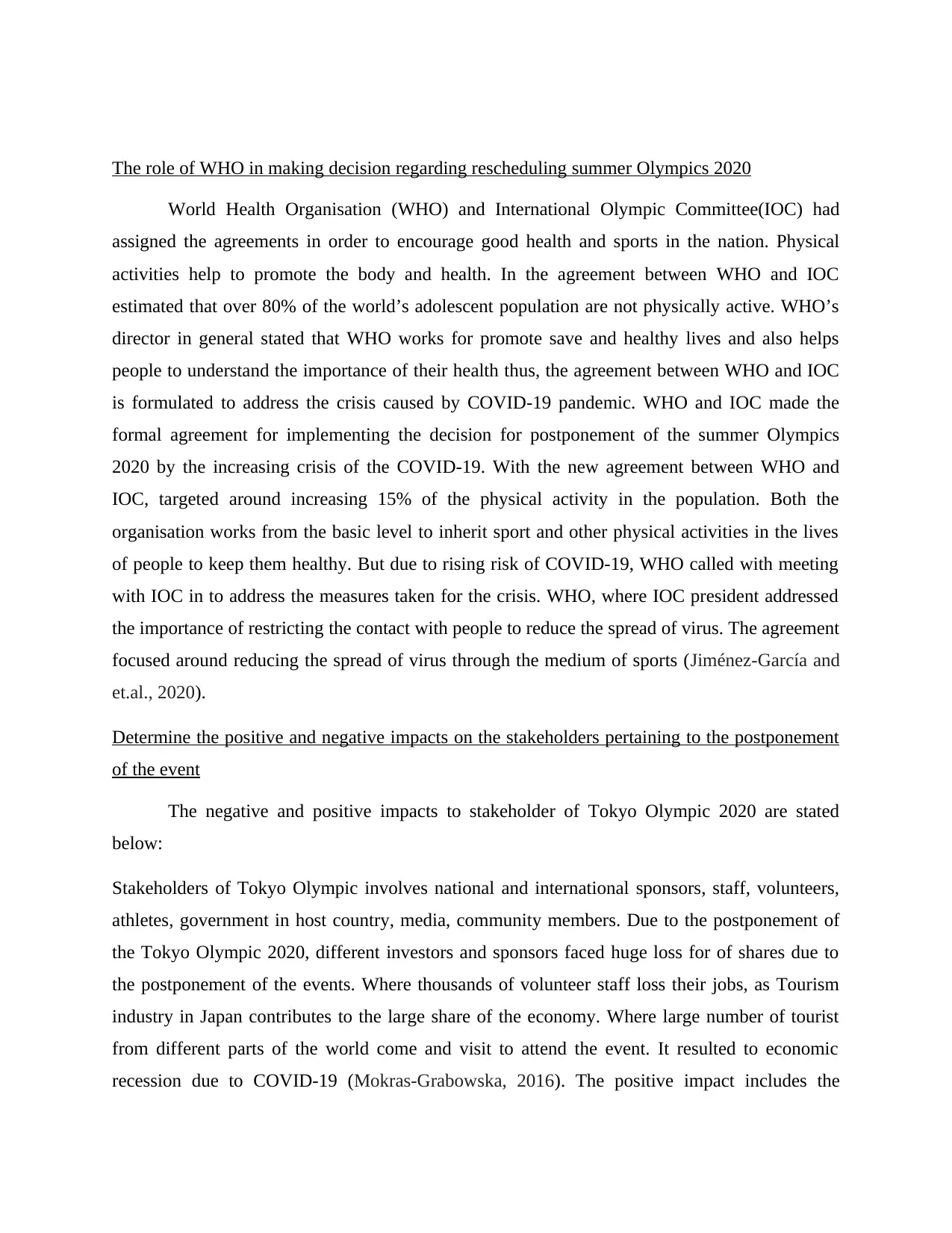
The role of WHO in making decision regarding rescheduling summer Olympics 2020
World Health Organisation (WHO) and International Olympic Committee(IOC) had
assigned the agreements in order to encourage good health and sports in the nation. Physical
activities help to promote the body and health. In the agreement between WHO and IOC
estimated that over 80% of the world’s adolescent population are not physically active. WHO’s
director in general stated that WHO works for promote save and healthy lives and also helps
people to understand the importance of their health thus, the agreement between WHO and IOC
is formulated to address the crisis caused by COVID-19 pandemic. WHO and IOC made the
formal agreement for implementing the decision for postponement of the summer Olympics
2020 by the increasing crisis of the COVID-19. With the new agreement between WHO and
IOC, targeted around increasing 15% of the physical activity in the population. Both the
organisation works from the basic level to inherit sport and other physical activities in the lives
of people to keep them healthy. But due to rising risk of COVID-19, WHO called with meeting
with IOC in to address the measures taken for the crisis. WHO, where IOC president addressed
the importance of restricting the contact with people to reduce the spread of virus. The agreement
focused around reducing the spread of virus through the medium of sports (Jiménez-García and
et.al., 2020).
Determine the positive and negative impacts on the stakeholders pertaining to the postponement
of the event
The negative and positive impacts to stakeholder of Tokyo Olympic 2020 are stated
below:
Stakeholders of Tokyo Olympic involves national and international sponsors, staff, volunteers,
athletes, government in host country, media, community members. Due to the postponement of
the Tokyo Olympic 2020, different investors and sponsors faced huge loss for of shares due to
the postponement of the events. Where thousands of volunteer staff loss their jobs, as Tourism
industry in Japan contributes to the large share of the economy. Where large number of tourist
from different parts of the world come and visit to attend the event. It resulted to economic
recession due to COVID-19 (Mokras-Grabowska, 2016). The positive impact includes the
World Health Organisation (WHO) and International Olympic Committee(IOC) had
assigned the agreements in order to encourage good health and sports in the nation. Physical
activities help to promote the body and health. In the agreement between WHO and IOC
estimated that over 80% of the world’s adolescent population are not physically active. WHO’s
director in general stated that WHO works for promote save and healthy lives and also helps
people to understand the importance of their health thus, the agreement between WHO and IOC
is formulated to address the crisis caused by COVID-19 pandemic. WHO and IOC made the
formal agreement for implementing the decision for postponement of the summer Olympics
2020 by the increasing crisis of the COVID-19. With the new agreement between WHO and
IOC, targeted around increasing 15% of the physical activity in the population. Both the
organisation works from the basic level to inherit sport and other physical activities in the lives
of people to keep them healthy. But due to rising risk of COVID-19, WHO called with meeting
with IOC in to address the measures taken for the crisis. WHO, where IOC president addressed
the importance of restricting the contact with people to reduce the spread of virus. The agreement
focused around reducing the spread of virus through the medium of sports (Jiménez-García and
et.al., 2020).
Determine the positive and negative impacts on the stakeholders pertaining to the postponement
of the event
The negative and positive impacts to stakeholder of Tokyo Olympic 2020 are stated
below:
Stakeholders of Tokyo Olympic involves national and international sponsors, staff, volunteers,
athletes, government in host country, media, community members. Due to the postponement of
the Tokyo Olympic 2020, different investors and sponsors faced huge loss for of shares due to
the postponement of the events. Where thousands of volunteer staff loss their jobs, as Tourism
industry in Japan contributes to the large share of the economy. Where large number of tourist
from different parts of the world come and visit to attend the event. It resulted to economic
recession due to COVID-19 (Mokras-Grabowska, 2016). The positive impact includes the
Paraphrase This Document
Need a fresh take? Get an instant paraphrase of this document with our AI Paraphraser
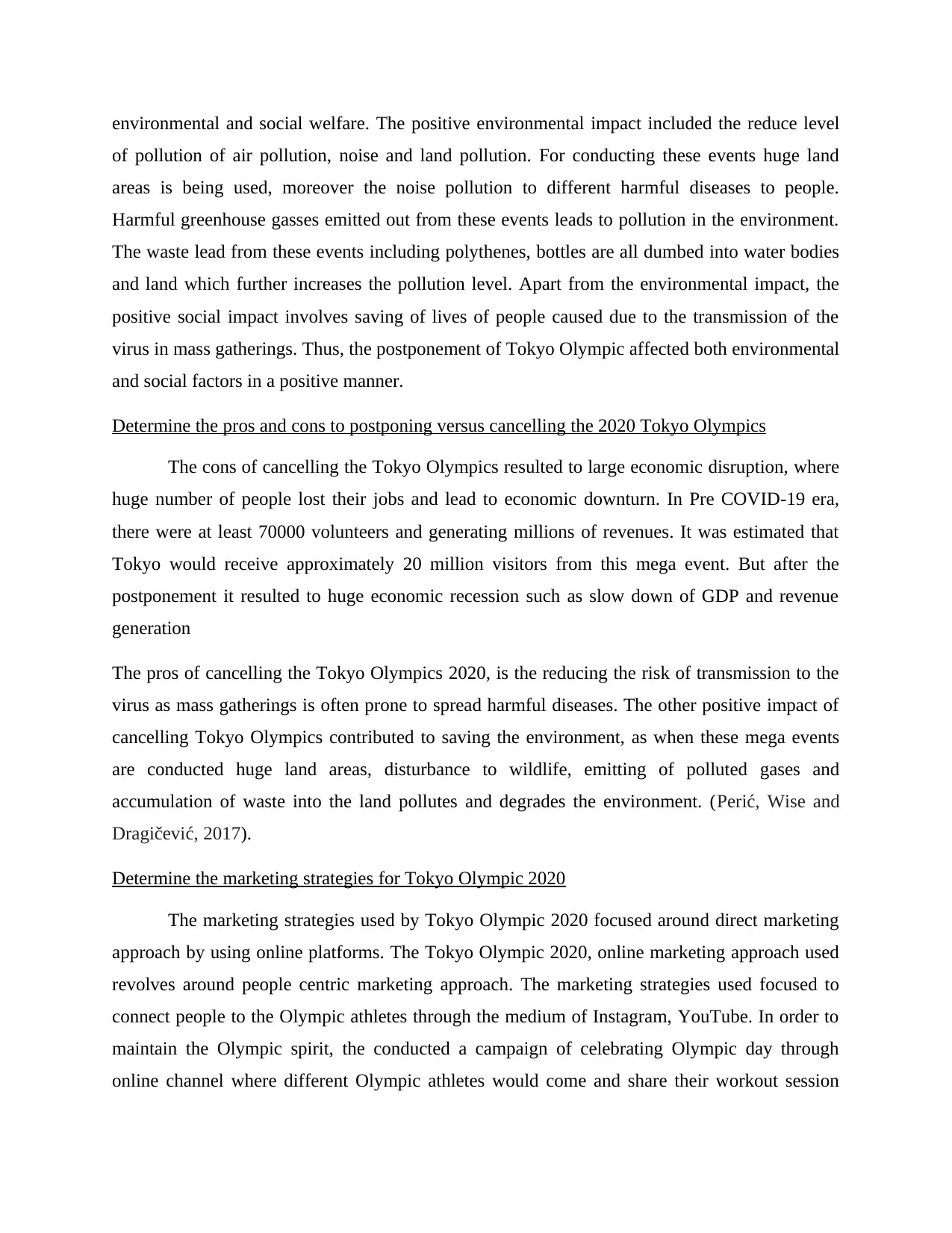
environmental and social welfare. The positive environmental impact included the reduce level
of pollution of air pollution, noise and land pollution. For conducting these events huge land
areas is being used, moreover the noise pollution to different harmful diseases to people.
Harmful greenhouse gasses emitted out from these events leads to pollution in the environment.
The waste lead from these events including polythenes, bottles are all dumbed into water bodies
and land which further increases the pollution level. Apart from the environmental impact, the
positive social impact involves saving of lives of people caused due to the transmission of the
virus in mass gatherings. Thus, the postponement of Tokyo Olympic affected both environmental
and social factors in a positive manner.
Determine the pros and cons to postponing versus cancelling the 2020 Tokyo Olympics
The cons of cancelling the Tokyo Olympics resulted to large economic disruption, where
huge number of people lost their jobs and lead to economic downturn. In Pre COVID-19 era,
there were at least 70000 volunteers and generating millions of revenues. It was estimated that
Tokyo would receive approximately 20 million visitors from this mega event. But after the
postponement it resulted to huge economic recession such as slow down of GDP and revenue
generation
The pros of cancelling the Tokyo Olympics 2020, is the reducing the risk of transmission to the
virus as mass gatherings is often prone to spread harmful diseases. The other positive impact of
cancelling Tokyo Olympics contributed to saving the environment, as when these mega events
are conducted huge land areas, disturbance to wildlife, emitting of polluted gases and
accumulation of waste into the land pollutes and degrades the environment. (Perić, Wise and
Dragičević, 2017).
Determine the marketing strategies for Tokyo Olympic 2020
The marketing strategies used by Tokyo Olympic 2020 focused around direct marketing
approach by using online platforms. The Tokyo Olympic 2020, online marketing approach used
revolves around people centric marketing approach. The marketing strategies used focused to
connect people to the Olympic athletes through the medium of Instagram, YouTube. In order to
maintain the Olympic spirit, the conducted a campaign of celebrating Olympic day through
online channel where different Olympic athletes would come and share their workout session
of pollution of air pollution, noise and land pollution. For conducting these events huge land
areas is being used, moreover the noise pollution to different harmful diseases to people.
Harmful greenhouse gasses emitted out from these events leads to pollution in the environment.
The waste lead from these events including polythenes, bottles are all dumbed into water bodies
and land which further increases the pollution level. Apart from the environmental impact, the
positive social impact involves saving of lives of people caused due to the transmission of the
virus in mass gatherings. Thus, the postponement of Tokyo Olympic affected both environmental
and social factors in a positive manner.
Determine the pros and cons to postponing versus cancelling the 2020 Tokyo Olympics
The cons of cancelling the Tokyo Olympics resulted to large economic disruption, where
huge number of people lost their jobs and lead to economic downturn. In Pre COVID-19 era,
there were at least 70000 volunteers and generating millions of revenues. It was estimated that
Tokyo would receive approximately 20 million visitors from this mega event. But after the
postponement it resulted to huge economic recession such as slow down of GDP and revenue
generation
The pros of cancelling the Tokyo Olympics 2020, is the reducing the risk of transmission to the
virus as mass gatherings is often prone to spread harmful diseases. The other positive impact of
cancelling Tokyo Olympics contributed to saving the environment, as when these mega events
are conducted huge land areas, disturbance to wildlife, emitting of polluted gases and
accumulation of waste into the land pollutes and degrades the environment. (Perić, Wise and
Dragičević, 2017).
Determine the marketing strategies for Tokyo Olympic 2020
The marketing strategies used by Tokyo Olympic 2020 focused around direct marketing
approach by using online platforms. The Tokyo Olympic 2020, online marketing approach used
revolves around people centric marketing approach. The marketing strategies used focused to
connect people to the Olympic athletes through the medium of Instagram, YouTube. In order to
maintain the Olympic spirit, the conducted a campaign of celebrating Olympic day through
online channel where different Olympic athletes would come and share their workout session
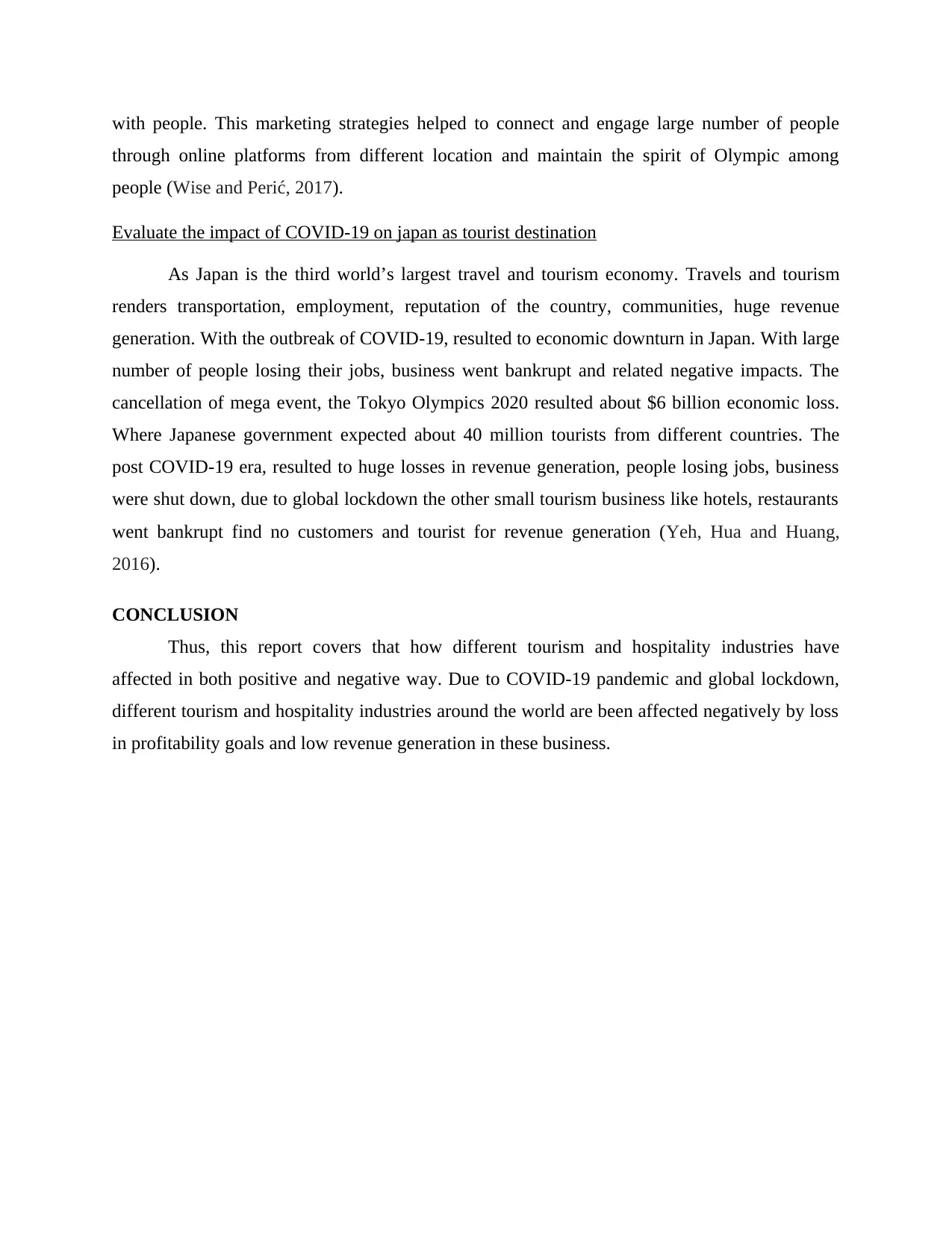
with people. This marketing strategies helped to connect and engage large number of people
through online platforms from different location and maintain the spirit of Olympic among
people (Wise and Perić, 2017).
Evaluate the impact of COVID-19 on japan as tourist destination
As Japan is the third world’s largest travel and tourism economy. Travels and tourism
renders transportation, employment, reputation of the country, communities, huge revenue
generation. With the outbreak of COVID-19, resulted to economic downturn in Japan. With large
number of people losing their jobs, business went bankrupt and related negative impacts. The
cancellation of mega event, the Tokyo Olympics 2020 resulted about $6 billion economic loss.
Where Japanese government expected about 40 million tourists from different countries. The
post COVID-19 era, resulted to huge losses in revenue generation, people losing jobs, business
were shut down, due to global lockdown the other small tourism business like hotels, restaurants
went bankrupt find no customers and tourist for revenue generation (Yeh, Hua and Huang,
2016).
CONCLUSION
Thus, this report covers that how different tourism and hospitality industries have
affected in both positive and negative way. Due to COVID-19 pandemic and global lockdown,
different tourism and hospitality industries around the world are been affected negatively by loss
in profitability goals and low revenue generation in these business.
through online platforms from different location and maintain the spirit of Olympic among
people (Wise and Perić, 2017).
Evaluate the impact of COVID-19 on japan as tourist destination
As Japan is the third world’s largest travel and tourism economy. Travels and tourism
renders transportation, employment, reputation of the country, communities, huge revenue
generation. With the outbreak of COVID-19, resulted to economic downturn in Japan. With large
number of people losing their jobs, business went bankrupt and related negative impacts. The
cancellation of mega event, the Tokyo Olympics 2020 resulted about $6 billion economic loss.
Where Japanese government expected about 40 million tourists from different countries. The
post COVID-19 era, resulted to huge losses in revenue generation, people losing jobs, business
were shut down, due to global lockdown the other small tourism business like hotels, restaurants
went bankrupt find no customers and tourist for revenue generation (Yeh, Hua and Huang,
2016).
CONCLUSION
Thus, this report covers that how different tourism and hospitality industries have
affected in both positive and negative way. Due to COVID-19 pandemic and global lockdown,
different tourism and hospitality industries around the world are been affected negatively by loss
in profitability goals and low revenue generation in these business.
⊘ This is a preview!⊘
Do you want full access?
Subscribe today to unlock all pages.

Trusted by 1+ million students worldwide
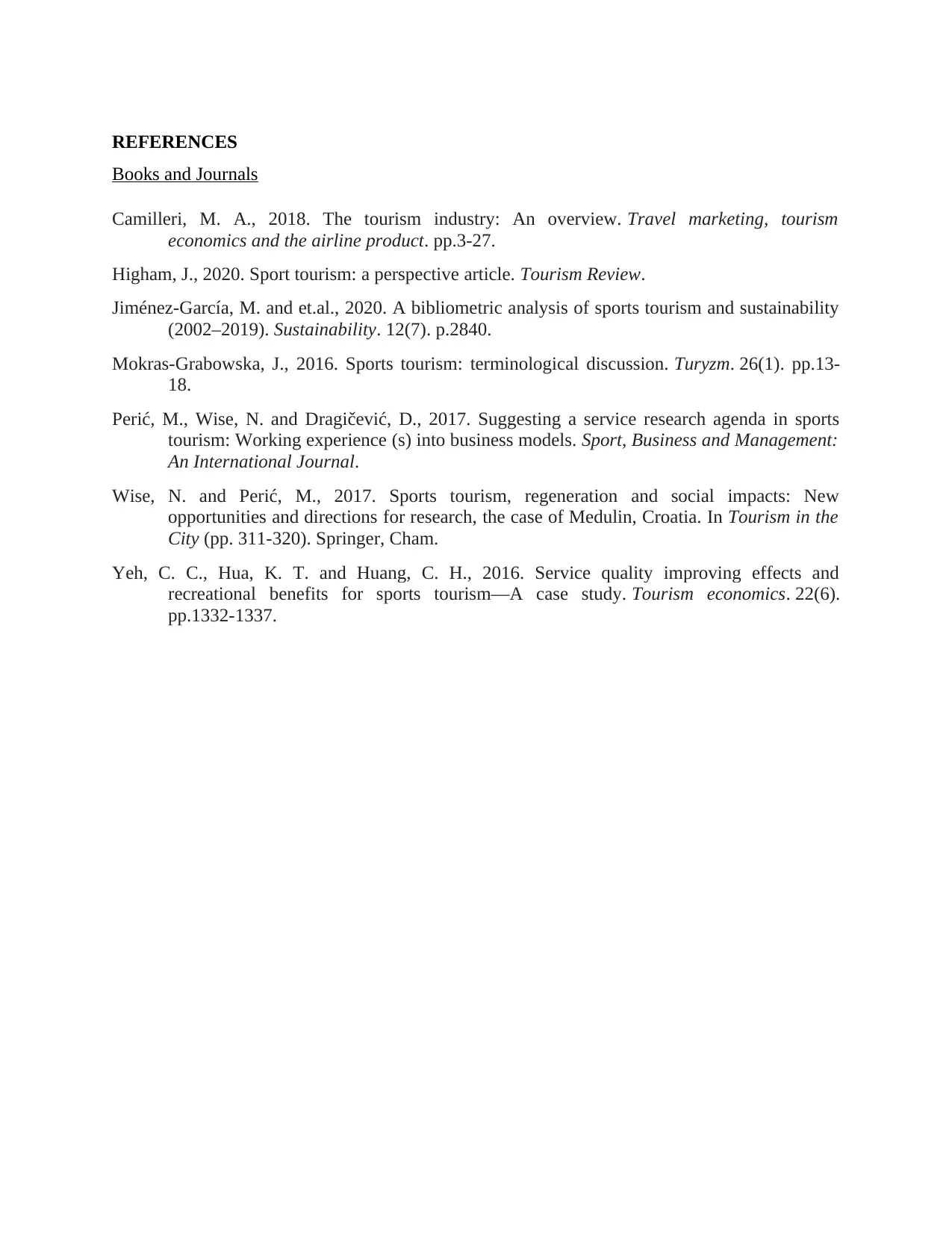
REFERENCES
Books and Journals
Camilleri, M. A., 2018. The tourism industry: An overview. Travel marketing, tourism
economics and the airline product. pp.3-27.
Higham, J., 2020. Sport tourism: a perspective article. Tourism Review.
Jiménez-García, M. and et.al., 2020. A bibliometric analysis of sports tourism and sustainability
(2002–2019). Sustainability. 12(7). p.2840.
Mokras-Grabowska, J., 2016. Sports tourism: terminological discussion. Turyzm. 26(1). pp.13-
18.
Perić, M., Wise, N. and Dragičević, D., 2017. Suggesting a service research agenda in sports
tourism: Working experience (s) into business models. Sport, Business and Management:
An International Journal.
Wise, N. and Perić, M., 2017. Sports tourism, regeneration and social impacts: New
opportunities and directions for research, the case of Medulin, Croatia. In Tourism in the
City (pp. 311-320). Springer, Cham.
Yeh, C. C., Hua, K. T. and Huang, C. H., 2016. Service quality improving effects and
recreational benefits for sports tourism—A case study. Tourism economics. 22(6).
pp.1332-1337.
Books and Journals
Camilleri, M. A., 2018. The tourism industry: An overview. Travel marketing, tourism
economics and the airline product. pp.3-27.
Higham, J., 2020. Sport tourism: a perspective article. Tourism Review.
Jiménez-García, M. and et.al., 2020. A bibliometric analysis of sports tourism and sustainability
(2002–2019). Sustainability. 12(7). p.2840.
Mokras-Grabowska, J., 2016. Sports tourism: terminological discussion. Turyzm. 26(1). pp.13-
18.
Perić, M., Wise, N. and Dragičević, D., 2017. Suggesting a service research agenda in sports
tourism: Working experience (s) into business models. Sport, Business and Management:
An International Journal.
Wise, N. and Perić, M., 2017. Sports tourism, regeneration and social impacts: New
opportunities and directions for research, the case of Medulin, Croatia. In Tourism in the
City (pp. 311-320). Springer, Cham.
Yeh, C. C., Hua, K. T. and Huang, C. H., 2016. Service quality improving effects and
recreational benefits for sports tourism—A case study. Tourism economics. 22(6).
pp.1332-1337.
1 out of 7
Related Documents
Your All-in-One AI-Powered Toolkit for Academic Success.
+13062052269
info@desklib.com
Available 24*7 on WhatsApp / Email
![[object Object]](/_next/static/media/star-bottom.7253800d.svg)
Unlock your academic potential
Copyright © 2020–2026 A2Z Services. All Rights Reserved. Developed and managed by ZUCOL.



